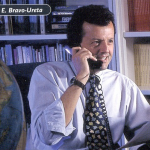Name: Boris E. Bravo-Ureta 
Title/Department: Professor, Agricultural and Resource Economics
Phone number: (860)486-1918
E-mail: boris.bravoureta@uconn.edu
Website: http://are.uconn.edu/Faculty/faculty—boris-bravo-ureta.php
Research focus: My technical expertise is in production and development economics and I have conducted extensive research on the forces leading to the growth of agricultural output with special reference to technical efficiency and productivity, economies of size, technology adoption, and natural resource management on hillside agriculture. More recently, I have focused on impact evaluation of development projects, the connection between climate change and agricultural productivity growth, and on irrigation and farm productivity. My research has focused on a number of countries and geographical areas including the United States, the European Union, Egypt, Ghana, Malawi, Morocco, Senegal, Uganda, Kenya, Zambia and several Latin American countries including Argentina, Bolivia, Chile, Ecuador, El Salvador, Guatemala, Honduras, Mexico, Nicaragua, Paraguay and The Dominican Republic. I have also coordinated diverse activities dealing with Chile, China, Egypt, Dubai, Armenia, India, Iraq, Turkey, Taiwan, Mexico, Vietnam, Cambodia and Brazil.
What excites you most about your PIRE research?
Over the years, I have worked in a number of African countries and have visited close to 90 countries around the world but this is my first project in Ethiopia, which makes it exciting. The project includes several institutions, disciplines and top-level researchers and this makes it exciting. We have an impressive set of in-country collaborators with great qualifications, and vast knowledge of and experience in Ethiopia and this makes it exciting. Finally the development issues being pursued are complex and this makes it very exciting.
What’s the most valuable aspect of your research for the people and communities?
I have worked in a number of agro-ecological settings with many different types of farmers and technical teams in numerous projects. So, I bring to our stakeholders many years of experience in academic and field research that, hopefully, will enhance our understanding of the challenges facing the households and communities we are working with. If we are fortunate, our team will be able to contribute with a speck of sand towards the improvement of living conditions in our focus area. Any improvement would be an unbelievable reward to all of us. I recently heard from a top development economist the following statement: “We do what we do because we don’t like what we see”. I think it is a great summation.